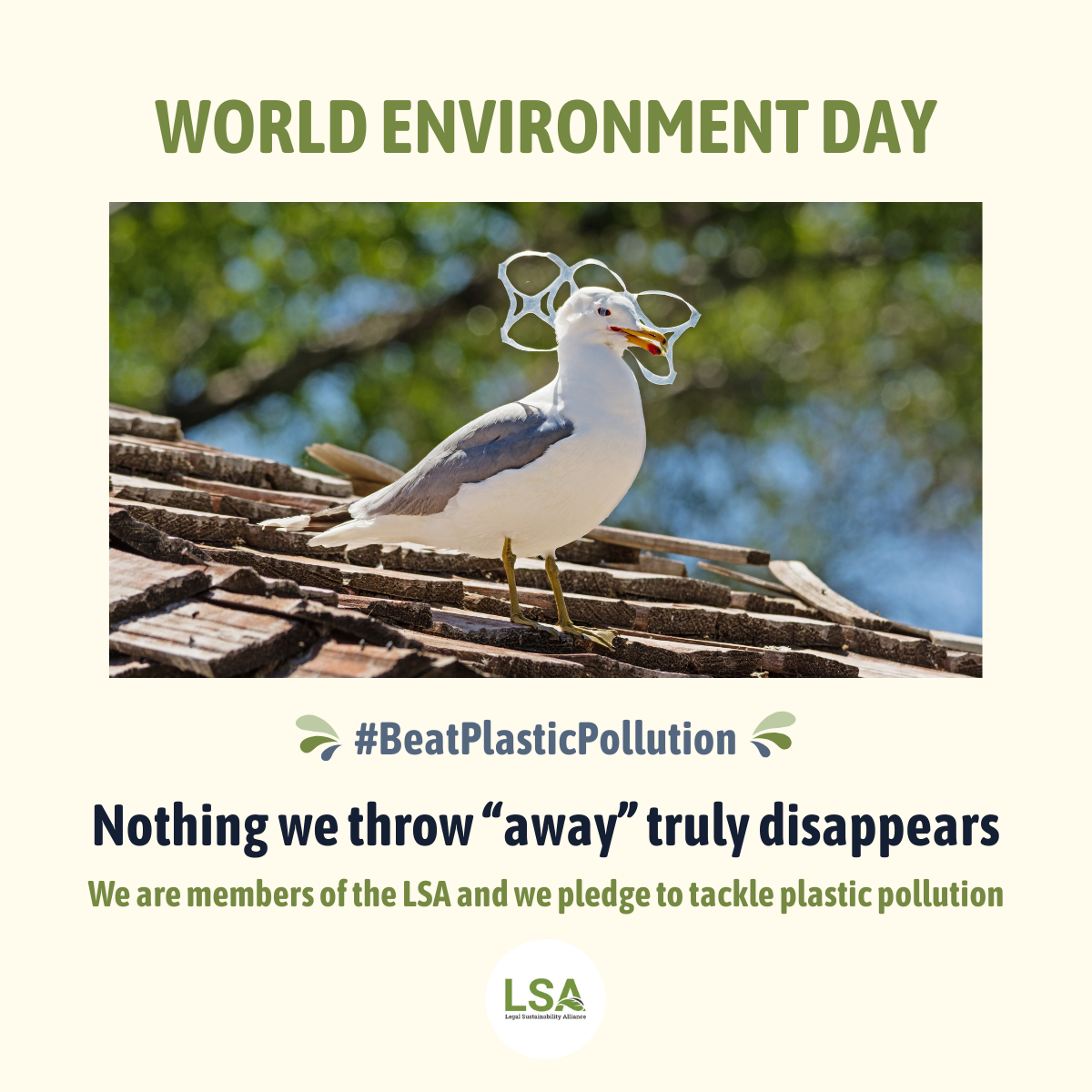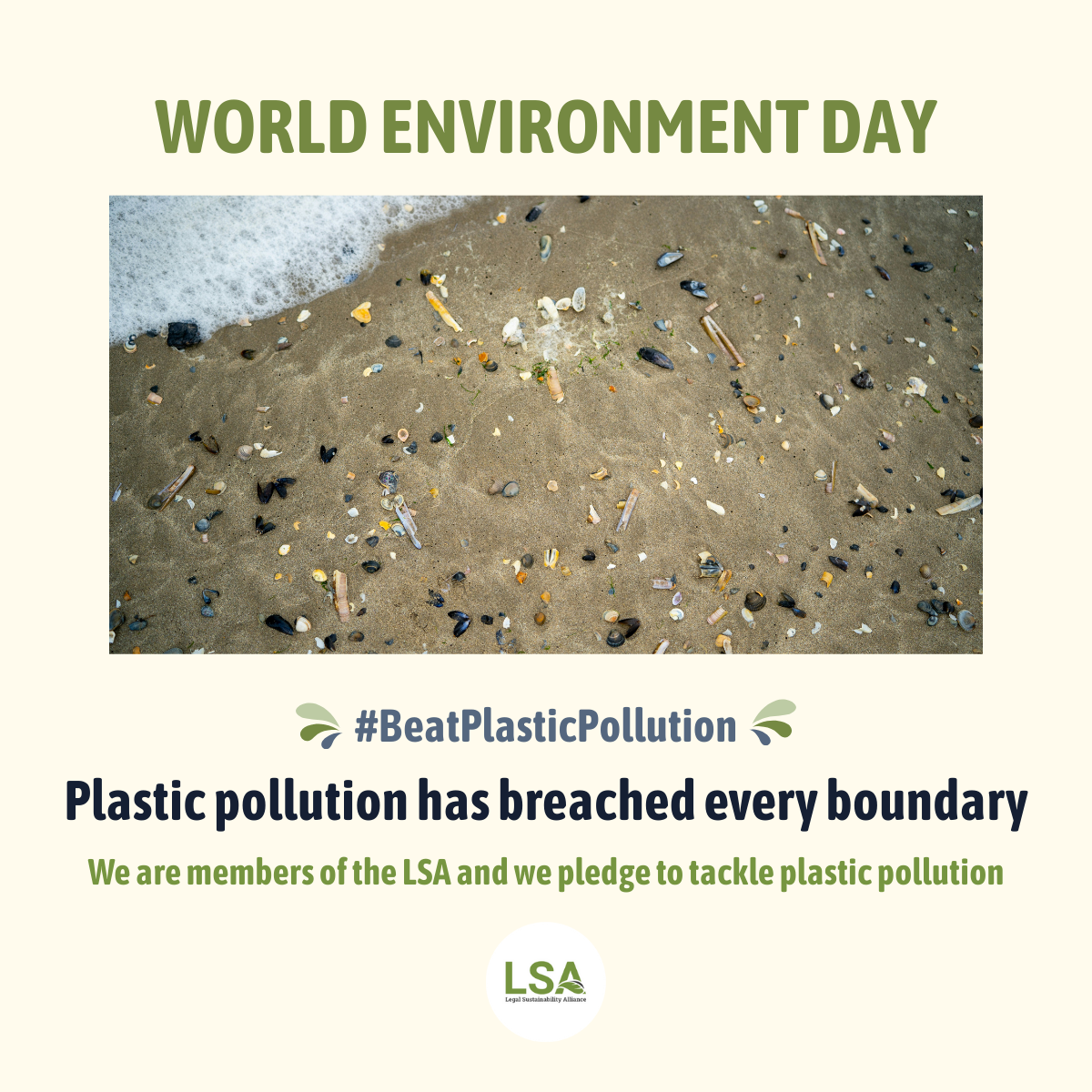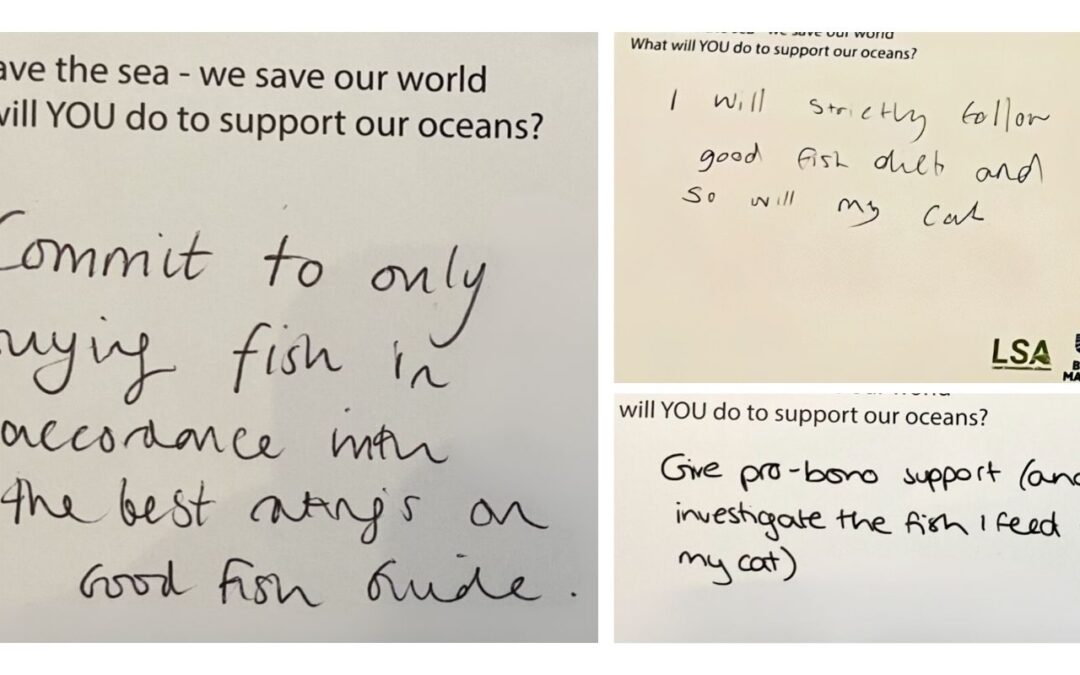
by Beth Salt | Dec 4, 2025 | LSA Insights
86 Pledges for the Ocean: The Legal Community Responds.
By Lucy Lennard, Achill Legal.
When concluding the private screening of David Attenborough’s Ocean, postcards were handed out with a simple question: What will YOU do to support our Oceans?
Over 80 came back.

What stands out wasn’t just the number—it was the specificity. These weren’t vague promises to “be more sustainable.” The audience pledged concrete commitments: timelines, measurements, real accountability. One member pledged to assess their firm’s entire investment portfolio for marine impacts by Q2. Others pledged to investigate the fish they were feeding their pets.
That level of detail matters. It’s the difference between good intentions and measurable change. The 86 postcards revealed five distinct ways the legal community is turning ocean awareness into action.
Consumer Choices: The Power of Your Plate
The majority of people focused on their daily choices. 34 pledges changed what’s on dinner plates, what’s in shopping baskets, how seafood gets sourced. The Marine Conservation Society’s Good Fish Guide appeared repeatedly—people committing to check it before every purchase.
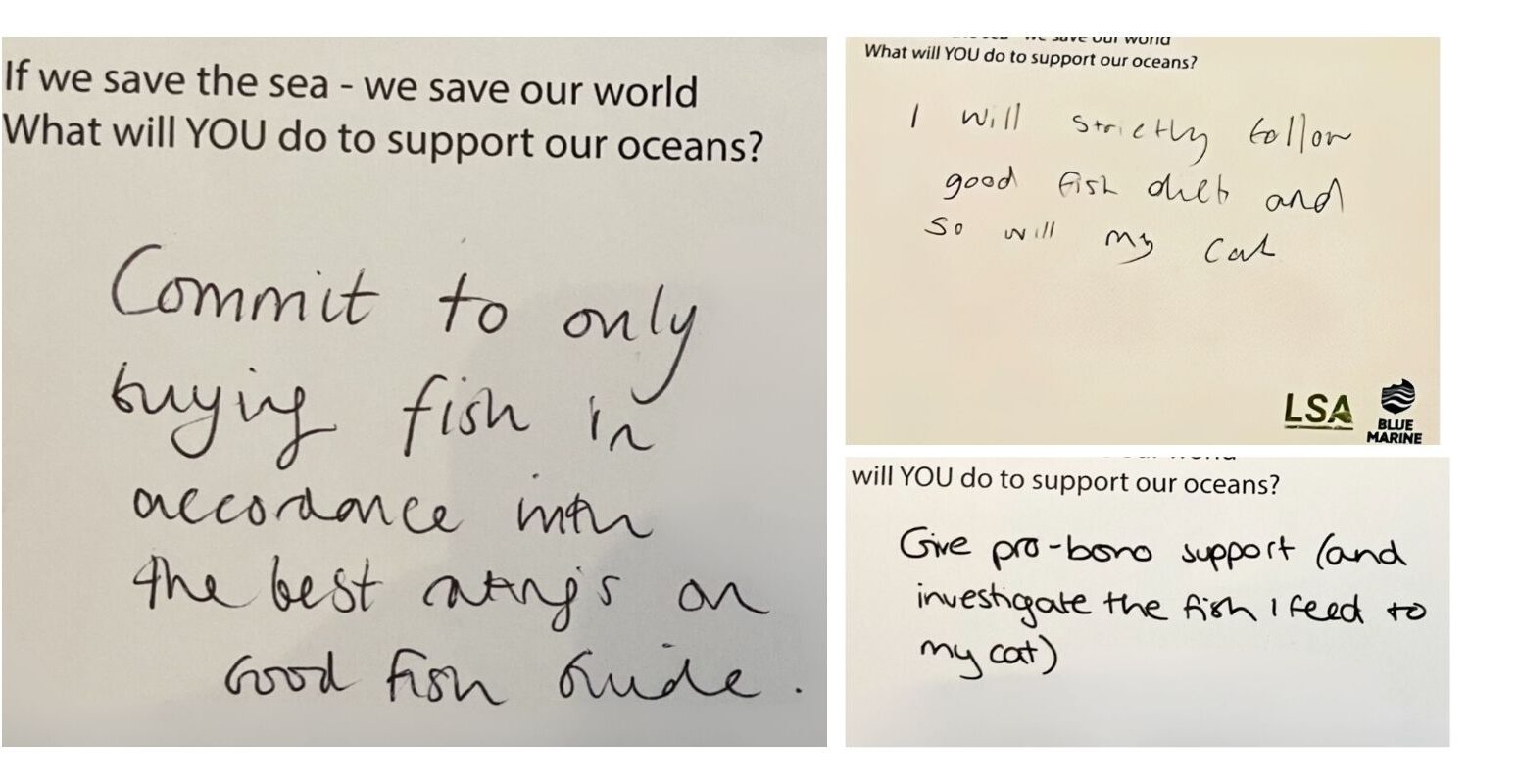
“Commit to only buying fish in accordance with the best ratings on the Good Fish Guide”
“Give pro-bono support (and investigate the fish I feed to my cat)” “I will strictly follow good fish diet and so will my cat”
Extending the commitment to household pets demonstrates how seriously people are rethinking their relationship with seafood. These purchasing decisions, multiplied across households and restaurants, create market pressure fishing industries cannot ignore.
The Good Fish Guide– This free tool eliminates guesswork through a simple traffic light system. Before you buy fish or order at a restaurant, check the rating.
- Green: Best choice—well-managed stocks, low environmental impact
- Amber: Some concerns—acceptable occasionally
- Red: Avoid—overfished stocks or destructive fishing methods
The pledges showed that specificity works. “Only green-rated fish” creates clearer behavioural guidelines than vague “eat sustainably” intentions.
Practical swaps: Choose smaller species like sardines and herring over large predators like swordfish and tuna. If you do eat tuna, look for “pole and line” or “line-caught” labels – these methods dramatically reduce bycatch. Avoid anything bottom trawled, like prawns. Above all, avoid taking Omega 3 krill supplements – the over-extraction of krill from Antarctica is wrecking the fragile ecosystem.
Professional Action: Legal Skills for Ocean Protection
Legal expertise came next, with 19 professionals pledging to deploy their skills directly toward ocean protection and sustainability.

“I pledge to continue to work on ocean pollution claims and to propose a group claim as part of my firm.”
Group litigation proves vital, holding polluters accountable at scale, transforming individual practice into systemic environmental enforcement.
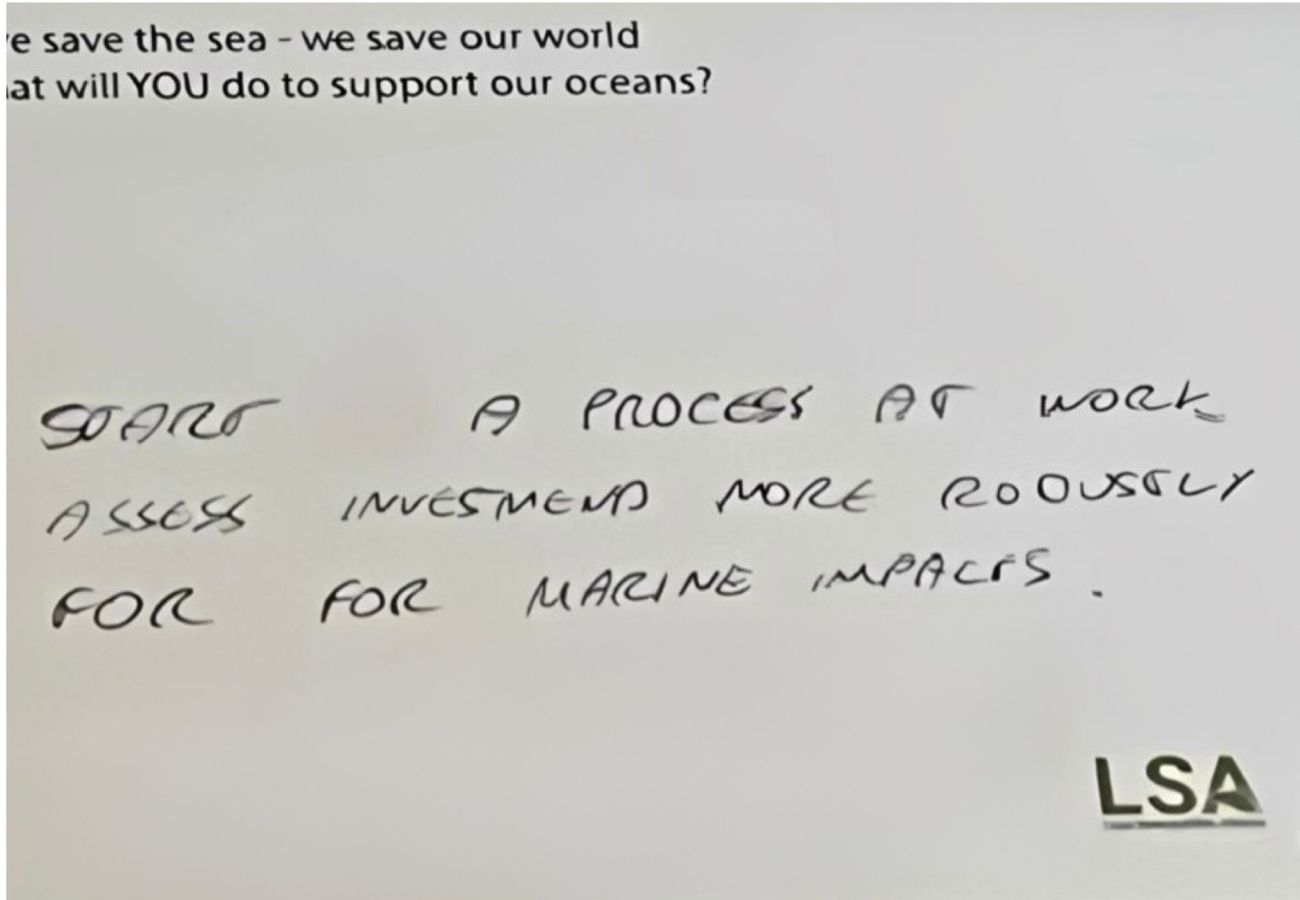
“Start a process at work assessing investments more rigorously for marine impacts.”
When investment decisions incorporate marine health, capital flows shift. Industries face financial pressure to reform.
This summer showed us what’s possible: Chloé Binet from De Bandt law firm—working entirely pro bono—secured a landmark European Court of Justice ruling for Blue Marine Foundation, challenging the European Commission’s blocking of protections for Indian Ocean tuna stocks.
Dr Tom Appleby, Blue Marine’s Head of Legal Affairs, explains why this legal support matters:
“More than two thirds of the Earth is covered by seas and oceans. Changing the management of this vast space is a huge legal challenge. No in-house team will ever have the breadth of expertise needed… Blue Marine are routinely faced with complex queries, where we can identify the questions—but we alone cannot answer them. Pro bono has been a critical ingredient for success in our projects in the UK, Europe and across the world.”
How to contribute your legal expertise:
Blue Marine Foundation needs help across Marine Protected Area frameworks, fisheries law, international ocean governance, and policy advocacy. Contact their legal team: legal@bluemarinefoundation.com
Clare Brook, Blue Marine’s CEO, responded to the pledges:
“We are utterly thrilled to have received so many pledges of support. It’s such a challenging time for NGOs, with governments reversing on environmental commitments and scrapping almost all funding. So, support like this—either in-kind or financial—is hugely uplifting and enables us to continue our vital work.”
Beyond dedicated pro bono, several pledges integrated ocean considerations into existing practice: assessing investment portfolios for marine impact, reviewing firm procurement for sustainable seafood, proposing environmental group litigation.
Political Pressure: From Commitments to Enforcement
Political pressure also featured heavily, with 17 pledges targeting MPs, policymakers, and institutional change.

“Write to my local MP to put pressure on banning trawling in UK waters.”
The UK committed to protecting 30% of its waters by 2030, yet many Marine Protected Areas still permit bottom trawling—the exact destructive practice Ocean documents so devastatingly.

“Collaborate with NGOs to raise the profile of bycatch at a political level to drive change.”
Bycatch—unintended capture and death of non-target species—destroys marine ecosystems at industrial scale. Elevating this politically requires sustained pressure from credible professional voices.
How to make your voice count:
Write to your MP with specific questions: What enforcement protocols ensure Marine Protected Areas actually protect marine life? What timeline exists for restricting bottom trawling in designated zones? What accountability measures track progress toward the 30% target?
Support targeted campaigns from Blue Marine Foundation and Marine Conservation Society. These organizations translate scientific research into policy-relevant advocacy but need amplification from professional voices to achieve political traction.
Spreading the Message
Many pledged to spread the message further by screening Ocean for colleagues, families, schools, and entire firms.

“Take everyone in the firm to watch Ocean (and their family) and then collaborate with the firm as to how we can make changes together to reduce our individual impact on our ocean.”
One screening becomes dozens of viewers, hundreds of conversations. Doug Anderson and Olly Scholey spent years capturing unprecedented footage of industrial bottom trawling precisely because invisibility enables destruction. Making the hidden visible transforms observers into participants.
Direct Action
Additionally, we had pledges for hands-on conservation: beach cleanups, river restoration, local volunteering.

“I will volunteer for a river and canal clean up day in my local area.”
Rivers carry pollution to oceans. Upstream intervention prevents downstream damage.
Join the effort:
Surfers Against Sewage coordinates beach cleanups nationwide. Direct financial support to Blue Marine Foundation and Marine Conservation Society enables their conservation work to continue despite contracting government funding.
Reduce plastic use daily: reusable containers, bottles, bags prevent waste entering water systems that flow to oceans.
What Comes Next
These pledges represent thousands of meals sourced differently, hundreds of pro bono hours redirected, dozens of MP letters, firms restructuring investment analysis, countless conversations extending awareness.
The specificity of these pledges matters. They’re not aspirational statements—they’re commitments with timelines, accountability, and measurable outcomes. One person’s pledge to review their firm’s supplier relationships by Q2 creates institutional change. Another’s commitment to check the Good Fish Guide before every purchase shifts market demand. A third’s decision to write to their MP adds constituent pressure for enforcement.
Individually, these actions seem small. Collectively, they represent the legal profession beginning to deploy its unique leverage toward ocean protection.
Your commitment:
If you haven’t made your pledge yet, email us: comms@legalsustainabilityalliance.com. Share what you’re committing to, and we’ll support your action across the legal sector.
Sir David Attenborough: “If we save our seas, we save our world.”
The legal profession is responding. Momentum exists. The question is scale.

by Beth Salt | Nov 7, 2025 | LSA Insights
Attenborough’s ‘Ocean’ Screening–Our Call to Action.
By Asia Mill, Sustainability Networks Coordinator, Achill Legal
During the first week of November, the team at the LSA had the immense privilege of hosting a private screening of David Attenborough’s Ocean in partnership with the Blue Marine Foundation. It was more than just a film night; it was a deeply affecting event that brought together members of the LSA and the wider legal profession for a crucial conversation.
The film, a passionate, beautiful, and at times deeply troubling exposé, uses unique footage to show the reality of the devastation caused by bottom trawling. The impact on those present was huge; I could see how moved people were, with the raw violence captured on screen sparking a strong, emotional response and a lively discussion in the room.

Behind the Lens and Beneath the Waves
We were honoured to be joined by the film’s creators and leading ocean advocates: Doug Anderson (Director of Underwater Photography), Olly Scholey (Producer/Director, Silverback Films), Clare Brook (CEO, Blue Marine Foundation), and Dr Tom Appleby (Head of Legal Affairs, Blue Marine).
Doug Anderson shared that his commitment to ocean storytelling was born from witnessing the destruction caused by scallop dredging in Scotland – a community effort that ultimately led to the creation of the country’s first no-take zone, supported by Tom Appleby’s pioneering legal work. Olly and Doug described the immense challenge of capturing the first-ever cinematic images of industrial bottom trawling, a pivotal moment that forced global attention onto the destruction hidden beneath the surface.
Clare Brook noted the film’s real-world power, citing how sharing this devastating footage with UK policymakers helped catalyse action, including new commitments to restrict bottom trawling in Marine Protected Areas (MPAs).
The Law of the Sea: An Outdated Framework
A key focus of the evening was the complex reality of marine law. Dr Tom Appleby delivered a stark message, explaining how outdated legal systems are the biggest challenge in protecting the ocean. He pointed out that “The sea itself doesn’t really exist in the eyes of the law,” being historically treated primarily as a fishery – a legacy inherited from ancient Roman law.
This archaic framework not only permits but often subsidises the appallingly wasteful and destructive practice of bottom trawling. We learned that as much as three-quarters of a regular catch can go back into the sea, dead, leaving the ocean floor a barren desert. Overfishing isn’t just permitted globally; it is often unregulated and actively encouraged.
Blue Marine’s legal team is working tirelessly to challenge and change this, with recent landmark successes, including the protection of the Dogger Bank. Dr Appleby’s message to the lawyers in the room was a powerful call to action: “Pretty much every single legal discipline can help – the system is such a mess, there’s room for us all.”
Hope and the Extraordinary Potential for Recovery
Despite the current devastation, the panellists stressed an incredibly hopeful message: the ocean is resilient. Marine reserves can recover in as little as four years, successfully restoring biodiversity, supporting local fisheries, and revitalising coastal economies.
Olly told our audience that no-take zones result in greater numbers of fish and marine life that ultimately spread beyond the MPAs, benefiting fishing communities, marine mammals, and ultimately, all of us. Clare noted that even against a backdrop of bleak global politics, Blue Marine is winning the fight, “each week we notch up another area protected, another politician persuaded, another legal battle won.”
Doug and Olly spoke movingly about filming communities that had chosen conservation over fishing, protecting their reefs and allowing children to swim amongst thriving marine life – demonstrating that prosperity and conservation can go hand in hand.
A Call to Action for the Legal Profession
The evening concluded with a clear and urgent plea to take action now. As lawyers, you are uniquely positioned to make a difference. As Amanda Carpenter, who moderated the discussion, reminded the audience: “You are the secret superheroes of the planet. You sit at the centre of every transaction – you can influence the future of our world.”
If you haven’t seen Ocean, please see it now. Then, make a pledge for the sea – either as an individual or on behalf of your firm – and let us know via comms@legalsustainabilityalliance.com – so we can amplify your efforts.
Suggested pledges include:
- Offer pro bono support: Utilise your legal expertise to support conservation efforts
- Support Marine Protected Areas: Help legally and practically establish MPAs
- Review supply chains: Eliminate support for unsustainable practices
- Donate to Blue Marine or take part in one of their fundraising events
In the words of Sir David Attenborough, “if we save our seas, we save our world.”

by Beth Salt | Oct 6, 2025 | LSA Insights
Equipping for the Future: Why the LSA Sustainability Academy Matters

By Asia Mill, Sustainability Networks Coordinator, Achill Legal.
If you work in the legal sector, you will know that Environmental, Social, and Governance is not a side project anymore – it is the core of responsible business. That is why I was so excited to hear about the new LSA Sustainability Academy, an initiative designed to build a pipeline of dedicated sustainability professionals in the legal industry.
My journey started with watching the initial webinar recording – I highly recommend it. The link is available here: Introducing the LSA Academy.

The Case for a Structured Pathway
The webinar brought an important issue to light: the lack of clear, accessible pathways into sustainability careers. This is where the LSA Sustainability Academy steps in, offering a Level 4 Corporate Responsibility & Sustainability (CRS) Practitioner Apprenticeship that is tailored for the legal world.
It is equivalent to a foundation degree, but crucially focuses on applied learning. As Simon Baker from LDN Apprenticeships stressed, the focus is on taking the theory and using it on real workplace challenges.
Programme Highlights:
- Build the Next Generation: The programme boosts the accessibility and diversity of the sustainability profession.
- Cost-Effective Capacity: For firms, especially those with the Apprenticeship Levy, it is a cost-neutral way to upskill current employees or bring in new talent.
- Shared Learning: Apprentices join a shared cohort across different firms, fostering a community of “change agents” and including sector-relevant masterclasses and networking.
- Professional Credentials: Apprentices get free professional membership to ICRS (the Institute of Corporate Responsibility and Sustainability) and ISEP (the Institute of Sustainability and Environmental Professionals).
The Application: Making My Role Count
After getting my head around the big picture, I attended the first insight session in August 2025. These sessions – still ongoing – are a great opportunity to ask questions and explore how the programme could work for you. The final insight session takes place on 14th October at 1pm – you can register here, or alternatively, you can book a one-on-one session with Alex Hand from LDN if you prefer a more personalised conversation.
After the session, I received the application link in my inbox; it included 15 core questions designed to map my current experience and future ambition against the required responsibilities of a sustainability champion.
I spent an hour drafting my answers. Honestly, a few questions were not an obvious fit for my current day-to-day. But this is exactly where the support of the LSA and LDN comes in.
I booked a call with Alex Hand, who was incredibly helpful. She clarified that the application is about demonstrating potential and outlining how the apprenticeship will equip you to deliver on these responsibilities. We went through the list, finding ways my role could encompass some of the activities.
Thanks to Alex’s guidance, I submitted my application feeling confident that my enthusiasm and potential, supported by the Academy’s structure, were the key ingredients.
Navigating the Challenges (and Finding the Solutions)
The webinar was also excellent at addressing the elephant in the room: the commitment.
- The Time Commitment (80% Work / 20% Study)
Balancing full-time work with 20% protected study time can be challenging. That is why the programme is designed to be as flexible as possible, working around your workload. Every apprentice is paired with a dedicated coach to help plan and manage their time effectively, and LDN collaborates closely with line managers to ensure study time is protected by identifying realistic and flexible ways to accommodate it.
- High Responsibility, High Reward
Apprentices are expected to work on real projects early on. The programme frames this as a growth opportunity, supported by strong coaching to build confidence. As the LSA and LDN emphasise, it is about nurturing, not throwing apprentices into the deep end unsupported.
For smaller firms not paying the Apprenticeship Levy, funding can be a potential concern. The great news is the levy transfer scheme is available, allowing larger firms to donate unused funds to support apprenticeships in smaller organisations. The Academy is truly designed to be inclusive of firms of all sizes.
The LSA Sustainability Academy is a practical, structured, and highly supported way to build the skills needed for a sustainable career in law. It is about building a future-proof skillset, and I cannot wait for the launch in November 2025.
Interested in growing your own sustainability capability? You can still attend an Insight Session or contact Alex at alexandra.hand@ldnapprenticeships.com.

by Beth Salt | Sep 16, 2025 | LSA Insights, Small business Hub
Quick Wins for a More Sustainable Office
There are many quick and easy ways you can reduce your environmental impact and save money.
How to get started
If the number of options below feels overwhelming, start with a simple, three-step process:
- Measure your footprint: Use the LSA’s Carbon Calculator to calculate your baseline energy use, waste, and emissions.
- Focus on high-impact areas: Target the biggest sources of waste or emissions revealed by your audit to achieve the most significant results.
- Start small and build momentum: Implement one or two quick wins. As you see the benefits, you can expand your efforts and tackle bigger goals over time.
Recycling/ Resource Use
- Provide glasses and mugs rather than disposable cups
- Limit use of disposable goods e.g. pens, in favour of reusable ones
- Make it easy for staff to recycle as much as possible; paper, card, glass, plastic, aluminium, batteries, old phones
- Take away individual waste bins from desks and replace them with recycling bins
- Compost food waste
- Lengthen the life of toner cartridges by adjusting printer settings to draft quality – and black and white

- Recycle used toner cartridges
- Recycle old computer equipment by giving it to local charities or community groups
- At Christmas, make a donation to charity rather than sending cards
- Use environmentally friendly cleaning products
- Give an active preference to products with minimal packaging and that are locally sourced
- Discourage excessive ordering of stationery by installing a central ordering system
- Use local suppliers/caterers where possible
- Maximise savings by putting up signage reminding staff to save energy and reduce waste
- Fix dripping taps
Paper Use
- Only print when necessary
- Save paper costs by buying 100% recycled paper and reusing discarded paper for notes

- Default printers to print double-sided
- Print internal documents in size 11 font and reduce the borders to 1.5cm
- Inform staff whether agendas and minutes will or won’t be available at meetings to avoid duplication of printing
- Send internal memos electronically
- Use ‘track changes’ to review documents rather than printing
- Cancel junk mail and unwanted publications
- Re-use bubble wrap, boxes and padded envelopes where possible
- Collect and re-use name badges after events and meetings where possible
Energy Use
- Minimise energy costs by ensuring that all equipment and lights are turned off (i.e. not left on standby) when not in use
- Install movement sensors to meeting rooms. Encourage staff to switch off light switches by labelling light switches to indicate which area of th
 e office they light. Ask security to check all lights are switched off once the building is empty
e office they light. Ask security to check all lights are switched off once the building is empty
- Encourage staff to switch off monitors when away from their desks for more than 5 – 10 minutes and to shut computers down when they leave the office.
- Make sure everyone has a way to turn down the heating, rather than opening a window, to cool the office
- Check that heating is not timed to come on overnight or at weekends
- Turning the heating down by one degree saves 8% of the energy bill a year. The Environment Agency recommends 19 degrees C in the winter and 23 degrees C in the summer is comfortable for most staff
- If extra heating is needed, use oil-fuelled rather than electric fan heaters. They use 750W of energy as opposed to 3kW
- Ensure all light bulbs are energy efficient – LEDs are more efficient than halogen
- Ensure air conditioning vents or heating units are not blocked by office furniture/boxes
- Switch your electricity supplier to a green tariff. Many suppliers will assist in monitoring energy use and promoting reduction
Transport use
- Save time, inconvenience and pollution by using conference calls rather than travelling to meetings where possible
- Provide interest-free season ticket loans
- Use cycle couriers where possible
- Use LPG and/or carbon neutral taxi companies and encourage use of public transport whenever possible by making this easier to book through a central system
- Encourage staff to cycle to work by installing secure bike racks, shower facilities and offering cycle mileage allowance
- Introduce travel policies that reward car sharing

by Beth Salt | Sep 15, 2025 | LSA Insights, Small business Hub
Sustainability for Small Businesses
By Jim Haywood, Managing Director, Woodman Farrow Ltd.
Running a small business in today’s competitive marketplace is a constant challenge. Bills need to be paid and books need to be balanced whilst remaining profitable. Small law firms face many demands on often limited resources – including the time and expertise of colleagues and, of course, finances. When setting out priorities and budget planning, it may be tempting to reduce the focus on sustainability (in all its guises), or even ignore it altogether. Some small businesses may see it as an irrelevance and something that only the bigger players in the market need to worry about. After all, it’s just about compliance with environmental legislation, isn’t it? An understandable view but one missing the opportunities and benefits that sustainability offers firms of all sizes.

Of course, it’s a given that we all must comply with relevant environmental laws – for example, when dealing with waste, discharging anything to watercourses, or in demonstrating the energy efficiency of the business (e.g. via the UK’s Streamlined Energy and Carbon Reporting requirement). But being a sustainable business (and demonstrating that you are) is about much more than staying on the right side of the law. It can give your business a critical edge over your competitors as well as putting you in a good position to be a key part of the supply chain of larger companies. It can make you more attractive to lenders and investors and help you recruit and retain committed and engaged staff. Being sustainable can ultimately save you money and improve your bottom line.
The sustainability landscape is changing quickly:
- Around two thirds of investors now take sustainability performance into account[i] – a significant increase in the past few years. They often need to see hard evidence, such as a demonstration that your business meets a standard like the new VSME, the voluntary sustainability reporting standard for SMEs (see below). There is compelling evidence[ii] that companies with top ESG ratings are able to obtain financing on the capital market at significantly lower rates on average (average interest rate ~6.8 %a.) than ESG laggards (7.9 %)
- Companies with a strongly embedded sustainability culture and who ‘walk the talk’ score up to 70% higher on employee engagement than competitors who take the issue less seriously[iii]. They also retain 93% of their employees[iv]
- 80% of Gen Y/Z now expect companies to actively protect the environment[v]. Those who clearly do not can suffer serious consumer backlash. (Just think of the bad press and reputational damage suffered by fast fashion brands such as Boohoo)
- Sustainable products are in increasingly high demand from customers. (For example, Unilever’s purpose-led ‘Sustainable Living’ brands grew 69% faster than the rest of their portfolio in 2019)[vi]. Thinking and acting sustainably can open market opportunities (with both end consumers and B2B customers). This also helps promote innovation and efficiency, particularly for nimble and proactive small firms
- As energy prices increase (and security of supply becomes more uncertain), cutting energy through efficiencies and thoughtful use of power not only helps to reduce a dependence on grid supplied electricity but also helps cut carbon as well as saving money. It is estimated that the average SME could reduce energy bills by 18-25% by making energy improvements[vii] (such as installing solar panels with battery storage, changing out old lighting for LEDs, draught-proofing windows and doors, replacing old heating systems with more sustainable options (e.g. Air Source Heat Pumps), etc.)
Small law firms who respond positively and seize the many opportunities presented by embedding sustainability into their organisation are more likely to be the survivors in the competitive marketplace. Despite the possible up-front costs (for example, installing more energy-efficient equipment), becoming a sustainable business is a win-win situation. Experience shows that the ROI on expenditure which improves the sustainability of the business is worth the investment, particularly given the wider business benefits. (For example, there is usually a 4-5 year payback on the average solar panel installation (30kWp) for SMEs)[viii].
Finally, don’t forget the opportunity to highlight your own business’s commitment and progress with becoming a sustainable firm. If your firm has fewer than 250 employees, the newly introduced voluntary sustainability reporting standard (VSME) for non-listed SMEs requires a company to provide relevant information about its impacts on people and the environment, and the effects of environmental and social issues on its financial position, performance and cash flows in the short, medium, or long term. The standard is likely to attract the attention of B2B customers, lenders and other key stakeholders. They will be looking to see who adopts it; meeting the requirements is likely to become an expectation for doing business in the supply chain.
Not engaging with sustainability could leave you out in the cold. Not embedding it into all aspects of your business could, quite simply, put you out of business.
——
[i] Cse-net.org
[ii] MSCI
[iii] Gallup
[iv] WeSpire
[v] psico-smart.com
[vi] Unilever
[vii] UK Department of Energy & Climate Change (DECC)
[viii] heatable.co.uk
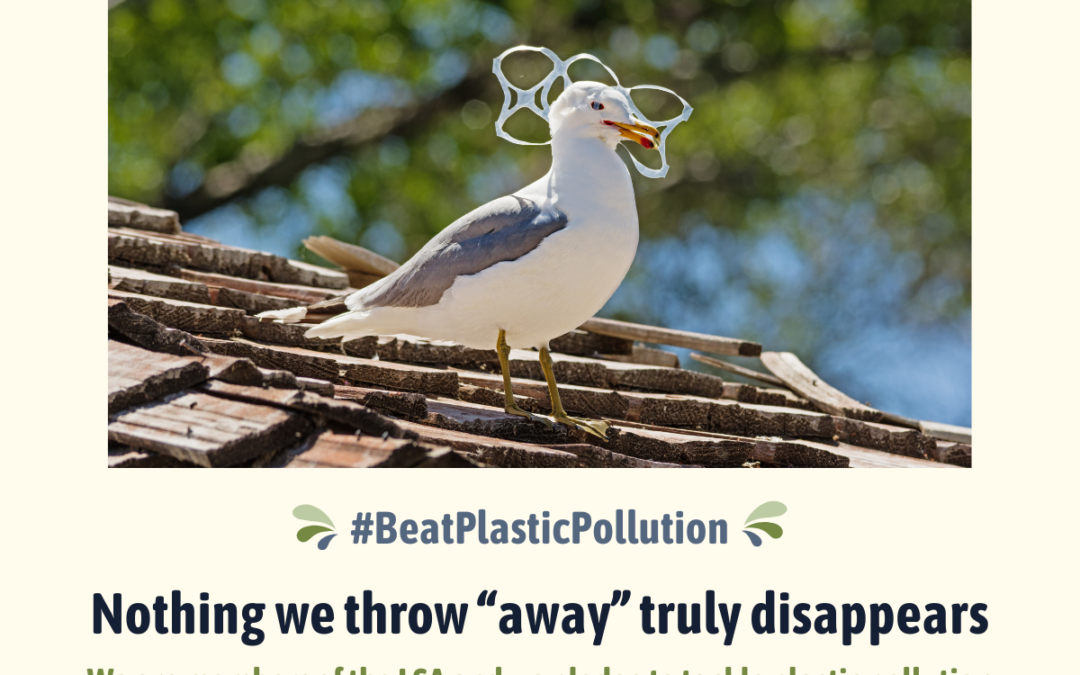
by Beth Salt | May 6, 2025 | LSA Insights
World Environment Day 2025
In 2025, the focus of World Environment Day is on ending global plastic pollution. This year, it falls exactly two months before countries meet to continue negotiating a global treaty to end this pervasive problem.
Individual actions truly matter, but when we collaborate with colleagues to drive systemic change in our workplaces and across our supply chains, our impact is supercharged. By choosing to work with businesses that prioritise sustainability, we can help shift the entire sector towards smarter, plastic-free practices.
To mark World Environment Day we are urging LSA members to take the following pledge by downloading these graphics and sharing them on your social media channels, or by creating your own version using this copy.
Please tag us in your posts so we can amplify the message. Download images are high res, please feel free to co-brand and resize as appropriate.
The pledge:
We commit to tackling plastic pollution, by reducing our plastic footprint and supporting businesses who minimise theirs.
Find out more about World Environment Day here.
Graphics for Social Media:


















 e office they light. Ask security to check all lights are switched off once the building is empty
e office they light. Ask security to check all lights are switched off once the building is empty


